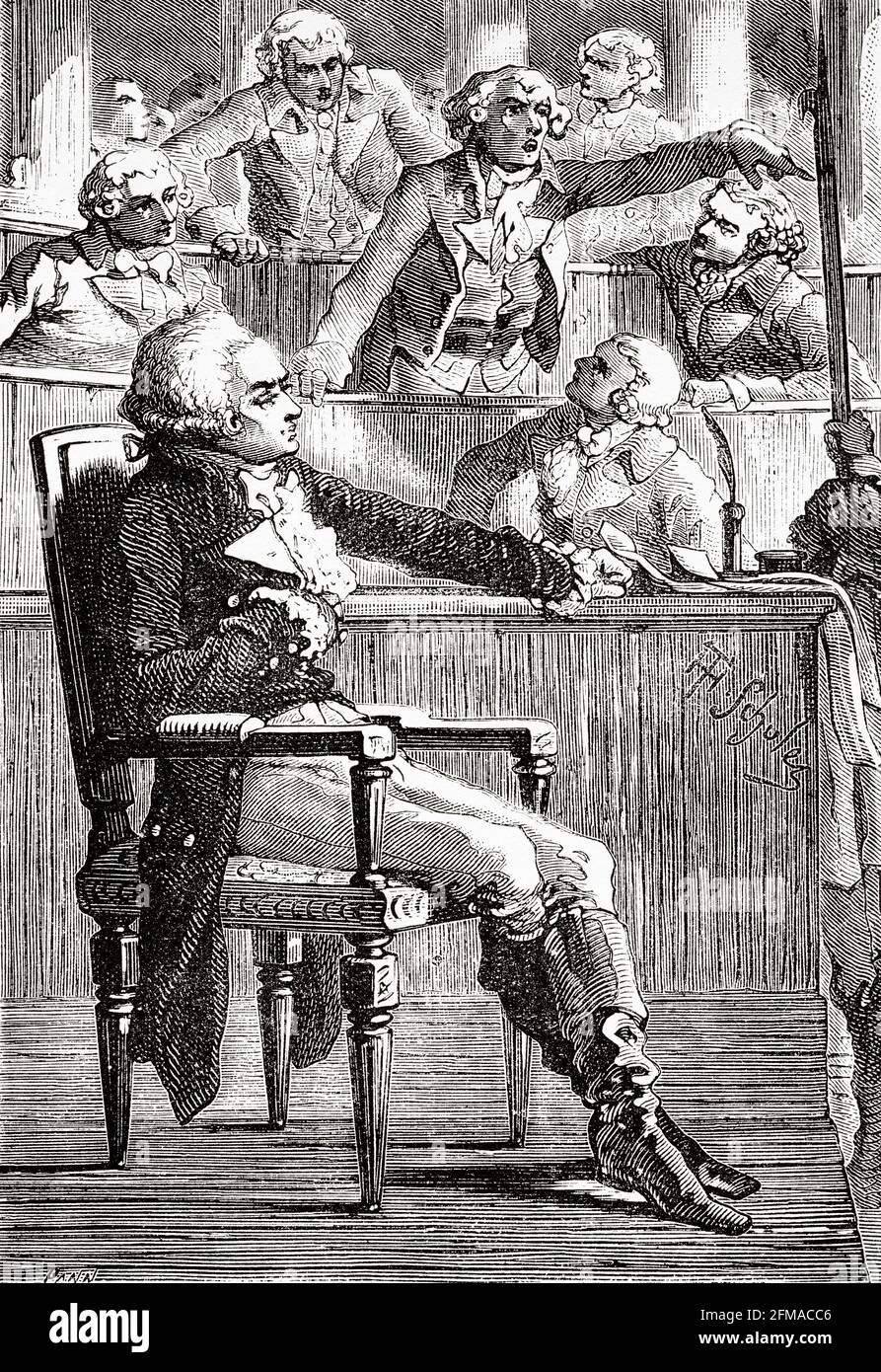In the annals of history, few figures loom as large or as controversial as Maximilien Robespierre and the Jacobins. Their brief but tumultuous reign during the French Revolution marked a period of both unprecedented idealism and reckless bloodshed.

Image: www.alamy.com
Robespierre: Visionary or Tyrant?
Born in 1758, Maximilien Robespierre was a brilliant lawyer and orator. Imbued with the Enlightenment principles of liberty, equality, and fraternity, he became a prominent figure in the early stages of the French Revolution. Robespierre’s unwavering belief in the virtuous intentions of the people drove his passionate pursuit of social justice.
But as the revolution spiraled into chaos, Robespierre became increasingly suspicious of counterrevolutionaries and demanded ever-harsher measures. His establishment of the notorious Committee of Public Safety gave rise to the “Reign of Terror,” a brutal campaign that saw thousands of alleged enemies of the people executed.
The Jacobins: Aspirations and Betrayals
The Jacobins were a political club that played a central role in the French Revolution. Founded in 1789, the club attracted a diverse group of intellectuals, revolutionaries, and members of the bourgeoisie. The Jacobins advocated for a republic based on popular sovereignty and the abolition of feudal privileges.
However, as the revolution progressed, the Jacobins became increasingly divided. Moderate Girondins, who favored a less radical approach, clashed with Robespierre’s more extreme “Montagnards.” This internal strife culminated in the overthrow of the Girondins and Robespierre’s ascendance as the dominant figure in the revolution.
The Legacy of the French Revolution
The French Revolution had a profound impact on the course of world history. It toppled the monarchy, established a republic, and ignited the ideals of liberty and equality. However, the Reign of Terror ultimately discredited the revolution and sowed the seeds of its own destruction.
Robespierre himself was guillotined in 1794, just nine months after ascending to power. His death marked the end of the Reign of Terror and the beginning of a new chapter in French history.

Image: slideplayer.com
Modern Interpretations of Robespierre and the Jacobins
Over the centuries, historians and scholars have debated the complex legacy of Robespierre and the Jacobins. Some view them as idealistic revolutionaries who fought for a just and egalitarian society. Others condemn them as fanatics who betrayed the very principles they claimed to uphold.
Contemporary discussions often draw parallels between the French Revolution and present-day political events. The rise of populism, the erosion of trust in institutions, and the fear of social upheaval have sparked renewed interest in the lessons to be learned from this tumultuous period in history.
Tips and Expert Advice from the Blogger
As a blogger who has delved deeply into the topic of Robespierre and the Jacobins, I offer the following perspectives:
– Remember that historical events are complex and subject to multiple interpretations. Avoid simplistic judgments and strive for a nuanced understanding.
– Draw inspiration from the ideals that inspired the French Revolution: liberty, equality, and fraternity. Let these principles guide your own life and activism.
Frequently Asked Questions
Who was Maximilien Robespierre?
Robespierre was a prominent French revolutionary leader known for his unwavering belief in social justice and his role in the Reign of Terror.
What were the Jacobins?
The Jacobins were a political club that played a central role in the French Revolution, advocating for a republic based on popular sovereignty.
What was the significance of the French Revolution?
The French Revolution toppled the monarchy, established a republic, and ignited the ideals of liberty and equality, inspiring revolutions around the world.
Are the ideals of the French Revolution still relevant today?
The ideals of liberty, equality, and fraternity continue to resonate with people around the world and inspire movements for social change.
Maximilien Robespierre And The Jacobins Are Best Known For
Conclusion
Maximilien Robespierre and the Jacobins remain enigmatic figures who fascinate and horrify in equal measure. Their lofty ideals and murderous actions raise complex questions about the nature of revolution, the limits of human power, and the enduring quest for a just society.
Are you interested in learning more about the French Revolution? Explore the vast array of resources available online and join the ongoing conversation about this pivotal moment in history.